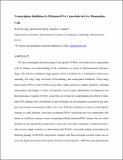Transcription Inhibition by Platinum DNA Cross-links in Live Mammalian Cells
Author(s)
Ang, Wee Han; Myint, MyatNoeZin; Lippard, Stephen J.
Downloadang et al JACS.pdf (779.3Kb)
PUBLISHER_POLICY
Publisher Policy
Article is made available in accordance with the publisher's policy and may be subject to US copyright law. Please refer to the publisher's site for terms of use.
Terms of use
Metadata
Show full item recordAbstract
We have investigated the processing of site-specific Pt−DNA cross-links in live mammalian cells to enhance our understanding of the mechanism of action of platinum-based anticancer drugs. The activity of platinum drugs against cancer is mediated by a combination of processes including cell entry, drug activation, DNA-binding, and transcription inhibition. These drugs bind nuclear DNA to form Pt−DNA cross-links, which arrest key cellular functions, including transcription, and trigger a variety of responses, such as repair. Mechanistic investigations into the processing of specific Pt−DNA cross-links are critical for understanding the effects of platinum−DNA damage, but conventional in vitro techniques do not adequately account for the complex and intricate environment within a live cell. With this limitation in mind, we developed a strategy to study platinum cross-links on plasmid DNAs transfected into live mammalian cells based on luciferase reporter vectors containing defined platinum−DNA lesions that are either globally or site-specifically incorporated. Using cells with either competent or deficient nucleotide excision repair systems, we demonstrate that Pt−DNA cross-links impede transcription by blocking passage of the RNA polymerase complex and that nucleotide excision repair can remove the block and restore transcription. Results are presented for 3800-base pair plasmids that are either globally platinated or carry a single 1,2-d(GpG) or 1,3-d(GpTpG) intrastrand cross-link formed by either cis-{Pt(NH3)2}2+ or cis-{Pt(R,R-dach)}2+, where {Pt(NH3)2}2+ is the platinum unit conveyed by cisplatin and carboplatin and R,R-dach is the oxaliplatin ligand, R,R-1,2-diaminocyclohexane.
Date issued
2010-05Department
Massachusetts Institute of Technology. Department of ChemistryJournal
Journal of the American Chemical Society
Publisher
American Chemical Society
Citation
Ang, Wee Han, MyatNoeZin Myint, and Stephen J. Lippard. “Transcription Inhibition by Platinum−DNA Cross-Links in Live Mammalian Cells.” Journal of the American Chemical Society 132.21 (2010) : 7429-7435.
Version: Author's final manuscript
ISSN
0002-7863
1520-5126